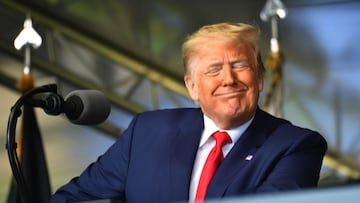Can Trump pardon Ivanka, Donald Jr, Eric and Giuliani?
The President has already saved Roger Stone and Michael Flynn from prosecution and reports claim he is considering presidential pardons for senior advisors.


Sources close to Donald Trump have confirmed that the President has consulted advisors regarding presidential pardons for a number of top officials. According to a report in the New York Times, Trump is considering granting pardons to his children, Ivanka, Donald Jr and Eric; son-in-law, Jared Kushner; and his personal attorney Rudy Giuliani.
He is not thought to have made a decision on the matter yet, but Trump is known to be concerned about possible consequences for those close to him once he has left office. During his time in the White House he has been able to protect his family and trusted advisors, but he will lose that privilege on 20 January.
The driver behind Trump's latest pardon talk is a fear he'll be prosecuted once he's out of office. In his recorded address, he says, "I hear that the same people who failed to get me in Washington have sent every piece of information to NY so that they can try to get me there."
— Kaitlan Collins (@kaitlancollins) December 2, 2020
Why would Trump issue pardons to Ivanka, Donald Jr, Eric and Rudy Giuliani?
It is thought that Trump is worried that, once President-elect Joe Biden takes office, he will look to launch investigations into key figures in the previous administration. The NYT recounts insight from sources close to the President which claim that he is concerned that Biden’s new Justice Department may “seek retribution” against Trump’s family.
Little in Biden’s post-election speeches and actions suggest that he has any desire to deepen the divisions in Washington but Trump does have some legitimate concerns about the exposure of those close to him. His eldest son, Donald Jr, was the subject of Robert Mueller’s extended investigation into Russian interference in the 2016 election but was not indicted by the special counsel.
The President’s daughter, Ivanka, has grown to play an important role in the Trump White House, currently listed as a senior advisor and accompanied her father at a G20 summit in Osaka last year. On Tuesday she was deposed by investigators as part of a lawsuit into misuse of inauguration funds for private purposes, which alleges that federal funding was funnelled into Trump's private businesses.
🚨BREAKING: Ivanka Trump was deposed Tuesday by the DC AG's office as part of its lawsuit alleging that the Trump Org and Presidential Inaugural Committee abused >$1 million by "grossly overpaying" for use of event space at the Trump hotel in Washington.https://t.co/pOz7Bs532f
— Dena Grayson, MD, PhD (@DrDenaGrayson) December 2, 2020
Rudy Giuliani has served as Trump’s private attorney for many years and has spearheaded the White House’s ill-judged legal challenge to the result of the 2020 election. Having immersed himself in Trump’s legal dealings Giuliani appears to be concerned about potential exposure, and CNN report that the lawyer has already privately discussed the possibility of a pardon with the President. Publically, Giuliani has denied the allegation, saying that talk of a pre-emptive pardon “is completely wrong”.
Trump has already granted a pardons to trusted loyalists
Shortly after the election result became clear, Trump took to Twitter to announce that he was offering a “full pardon” to his former national security advisor Michael Flynn. This came after Flynn had returned a guilty plea for charges related to lying to the FBI and to Vice President, actions that saw Trump fire him after less than a month in the job.
Earlier this year, the President commuted the prison sentence of long-time friend Roger Stone who was given a prison sentence after lying to Congress to protect Trump. This too, was a part of Mueller’s Russia investigation which encircled Trump during the early years of his presidency.
Despite his short tenure as Pres. Trump’s national security adviser, Michael Flynn has remained a "fixture" of the Trump administration, @carolelee reports in an in-depth look at Flynn's firing.https://t.co/ByV0VODr7g
— MSNBC (@MSNBC) December 3, 2020
What are the rules for presidential pardons?
Presidential pardons are reserved for "[o]ffenses against the United States”, which means that they can only protect the recipient from federal cases, not state or local charges. In the case of Trump’s senior advisors this would likely be sufficient given that any charges will be related to their time working for the federal government.
Related stories
There is, constitutionally, nothing to limit the number of people that a president can pardon but there is one possibility that is yet to be fully explored. Some have suggested that Trump may attempt to pardon himself before he leaves office next year, essentially making him unaccountable for any crimes he may have committed during his presidency.
Rep. Mark Pocan on Trump: "If he pardons himself, he's admitting he's broken the law multiple times." @MSNBC
— Kyle Griffin (@kylegriffin1) November 26, 2020
The only historical precedent for such an outrageous move comes from Richard Nixon’s pardon in 1974. Realising that his involvement in the Watergate scandal could lead to federal charges Nixon resigned the presidency, making his running –mate Gerald Ford the president. One month later, Ford issued a presidential proclamation to pardon Nixon for any wrong-doing. However he did insist that Nixon release a statement of contrition, essentially accepting the blame. It remains to be seen if Trump would be willing to swallow his pride and do the same.

